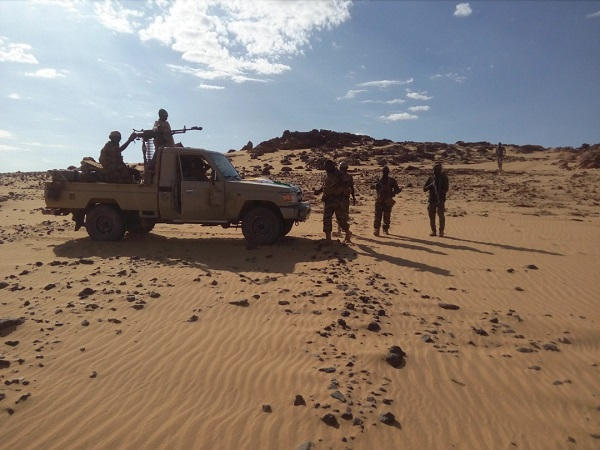
Mali, Niger and Burkina Faso form the Alliance of Sahel States and enter into a collective defense pact
In January 2017, members of the G5 Sahel, Mali, Burkina Faso, and Niger announced the creation of a “multinational force to secure Liptako-Gourma.” [FMS/LG]On the model of a multinational joint force [FMM] Which was implemented earlier by the Lake Chad Basin countries [Nigeria, Cameroun, Niger et Tchad] To fight the jihadist group Boko Haram.
“We decided [….] Pooling our intelligence resources and capabilities [militaires] Operational measures to deal with the security situation” in Liptako-Gorma [c’est à dire la région des « trois frontières », ndlr] In fact, Mahamadou Issoufou, then President of Niger, made it clear.
Just a few weeks later, the G5 Sahel re-introduced the idea of creating a joint force [FCG5S] In order to fight more effectively against jihadist groups in the region, by aligning seven battalions [soit 5000 soldats] Submitted by Member States and deployed in three regions [ouest / centre / est].
However, despite the support of the French Barkhane force, the FCG5S forces had difficulty settling… and Mali, in a way, dealt them the final blow by withdrawing from the G5 Sahel after the coup that brought Colonel Assimi Goita to power. power.
Since then, Burkina Faso and Niger have followed the same path as Mali, and are now led by putschists in power who, moreover, make no secret of their dissatisfaction with France. Moreover, the Russian paramilitary group Wagner has successfully established itself in the Sahel-Saharan region, where Bamako has requested its services.
Moreover, since the ouster of President Bazoum on July 26, Burkina Faso and Mali have approached Niger, going so far as to promise assistance should ECOWAS undertake a military intervention to re-establish peace and constitutional order in Niamey.
Therefore, in this context, on September 16, these three countries established a “security pact” by signing the “Liptako-Gorma Pact.” This aims to establish a “Coalition of Sahel States” and create an “Instruction for Collective Defense and Mutual Assistance.”
Hence, Article 6 of this Charter stipulates that “any attack on the sovereignty and territorial integrity of one or more Contracting Parties shall be considered an aggression against the other Parties and shall entail the duty of assistance and relief on all Parties, individually.” Or collectively, including the use of armed force to restore and ensure security within the area covered by the Alliance.
This clearly constitutes a collective defense clause, such as that stipulated in Article V of the NATO Charter.
In pictures, the Liptako-Gorma Charter establishing the Sahel States Alliance between Burkina Faso, the Republic of Mali and the Republic of Niger, presented the subject of the animated press briefing on Saturday, September 16, 2023. pic.twitter.com/okSjsMUmyY
– Ambassador. Abdullah Diop (@AbdoulayeDiop8) September 17, 2023
“This alliance will be a combination of military and economic efforts between the three countries,” said Abdallah Diop, head of Malian diplomacy. He stressed that “our priority is to combat terrorism in the three countries.”
At first glance, this agreement may allow Wagner Group elements present on Malian territory to operate in Niger, under the guise of fighting against jihadist groups. However, the security situation in Mali has deteriorated further in recent days, in particular increasingly noticeable tensions between Bamako and the former Tuareg rebellion for independence, who are clearly trying to raise the bar again.

“Unapologetic pop culture trailblazer. Freelance troublemaker. Food guru. Alcohol fanatic. Gamer. Explorer. Thinker.”
